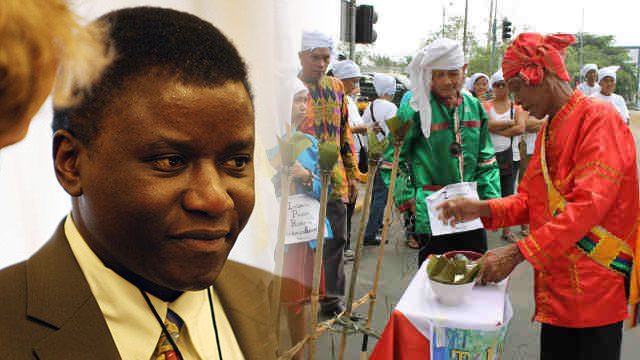SUMMARY
This is AI generated summarization, which may have errors. For context, always refer to the full article.

DAVAO CITY, Philippines – Indigenous peoples in the country must be guaranteed their rights, most especially their security and protection, in the context of conflict in Mindanao, the United Nations Special Rapporteur on the human rights of internally displaced persons said.
In his 10-day visit to the Philippines, Chaloka Beyani went to the evacuation center of more than 700 displaced Lumad from Davao del Norte and Bukidnon in Davao City last July 26 to directly talk with the affected residents whom the military and North Cotabato 2nd District Representative Nancy Catamco claimed are being held illegally by support groups.
“I heard from the [Armed Forces of the Philippines] its assertion that it is seeking to protect the communities and provide services to them in conflict regions; however the displaced IPs made it clear that it is their presence and that of the paramilitary groups in their communities that continues to create anxiety amongst the indigenous communities,” Beyani said.
He added: “The community wishes to return to its lands but stressed to me that they will only feel safe to do so if the long-term militarization of their region comes to an end and they can return with guarantees of safety, dignity and protection,”
Last July 23, at least 500 government agents and police forces in anti-riot gear, allegedly under the instigation of Catamco and several military officials, forcibly opened that gate of the evacuation center to “rescue” displaced residents and take them back to their communities.
The displaced residents resisted and government forces responded violently by throwing rocks and rushing in with shields and truncheons leaving at least 18 Lumad, including a Datu, wounded.
Beyani said he is also alarmed over the alleged case of force recruitment of Lumad to join the paramilitary group Alamara, which is being accused of human rights violations in the area.
“They described to me their concerns including their alleged forced recruitment into paramilitary groups, known as Alamara, under the auspices of the AFP and harassment in the context of the ongoing conflict between the AFP and the NPA,” Beyani said.
‘Pay attention to causes of displacement’
The UN Special Rapporteur said he was worried about the reported cases of school occupations done by the Alamara and government forces in the area.
“Schools have reportedly been closed and/or occupied by the AFP or Alamara, hampering the access to education of indigenous children,” Beyani said.
With the violence that occurred last July 23, Beyani urged the government to work with the affected residents to peacefully resolve the issue on militarization and development so that they can immediately return to their villages.
“While tribal leaders informed me that they are not being detained against their will at the UCCP center in Davao, as is evident by reports of their periodic return to their communities, their current situation is neither acceptable nor sustainable. It is essential to find a rapid and peaceful solution to their situation in full consultation with their legitimate leaders, with their voluntary and secure return to their ancestral lands being a high priority,” Beyani said.
“I urge the Government, in consultation with indigenous peoples themselves, to give greater attention to addressing the causes of displacement whether it be due to the militarization of their areas or due to development projects.”
Beyani commented that the rights of indigenous peoples must always be protected to ensure the preservation, not just of lives, but also of the culture, heritage, and the ancestral lands of the Lumad of Mindanao.
“This situation clearly demonstrates the massive and potentially irreversible impact of the ongoing conflicts on displacement of such vulnerable communities who are often caught up in the conflict and suspected of involvement with armed groups,” Beyani said.
“Displacement, whether due to conflict or development, not only destroys the homes and livelihoods of indigenous peoples, but has an incalculable impact on their cultures and ways of life that are part of the rich and diverse heritage of the Philippines that must be protected or otherwise lost, perhaps forever.” – Rappler.com
Add a comment
How does this make you feel?
There are no comments yet. Add your comment to start the conversation.